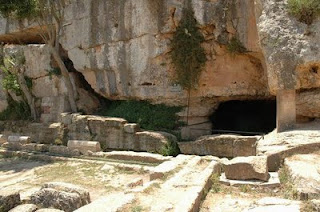 |
| Cyrenean coin that depicts Ammon Zeus. |
 |
| The Greek Pentapolis in the Cyrenean penisula. |
The colonization of Libya by Theran pioneers was among the latest colonizing projects of the ancient Greeks and was an isolated phenomenon.It was a specific situation created by the overpopulation of the Greek island of Thera(modern Santorini)
According to the Theran tradition Grinnos the king of Thera went to the Oracle of Delphi with Battus son of Polymnestos to consult the Oracle. Pythia told them to found a colony in Libya.The Thereans paid a Cretan fisher named Corobius to come with them to Thera and shortly after, with a small party and Corobius as pilot, they set sail for Libya. The men landed on Platea and left Corobius there with enough supplies for a short while and then returned to their island bringing good news about finding the new colony. Corobius agreed to wait on Platea for a length of time, however his supplies began to run out. Luckily, a Samian vessel bound for Egypt under command of Colaeus was re-routed to Platea due to poor weather conditions. The crew gave Corobius enough food to last one year. Colaeus and his crew were anxious to reach their destination as easterly winds prevented them to travel to Egypt and they were driven as west as the Pillar of Hercules (modern Strait of Gibraltar). By fortunately they landed at the wealthy trading post of Tartessus.
 |
| The route of the Theran colonists. |
A group of settlers was formed consisting of one brother from every household of Thera with sons,under the leadership of Battus. Eventually two ships set out for Plataea. After a two years stay on Plataea and another appeal to Delphi the settlers moved to the mainland and passed to Aziris somewhere westwards remaining there sic years. Finally they were led more westwards by natives to Cyrene. Today the historians claim that the colonization of Cyrenaica was a part of a more complex process.There are indications that there was Cretan Samian and Rhodian involvement in the colonization process.
 |
| The fountain of Apollo |
It is generally believed that the city of Cyrene was founded in 631 BC.The name comes from a fountain called "Cyre", which was believed to have been consecrated to Apollo. In addition to naming the settlement, Battus made all the colonists swear an oath. There is an inscription dated from the 4th century BC, which claims to contain the original oath. It may be assumed that the small greek settlement found its first foothold on the Acropolis(defensive hill) of Cyrene and the community's weakness and isolation compelled its pioneers to find an accommodation with the Libyan natives.Since the colonists were all men they married Libyan women. Some scholars have believed that Battus is a Libyan word mainly since the first recorded king of Cyrene had a different name(Aristoteles). Herodotus mentions that Battus meant "king" in Libyan.Although, other scholars believe that the personal name Battus became synonym of king for the Libyans.
Herodotus emphasizes on the mutual influence between the greeks of Cyrene and the Libyan tribe Asbystae who taught them to drive the four horse chariot and themselves adopted Greek customs. However other sources mention conflicts between the Greek settlers and their Libyan neighbors.
Battus died in 600 BC and was worshipped as a heroic figure by his subjects. His grave is near the marketplace which joins the road he ordered the construction of, leading to the temple of Apollo. A statue of Battus was dedicated at Delphi, by the subjects of Cyrene. He is represented riding in a chariot driven by the nymph of Cyrene, with a figure symbolising Libya in the act of crowning him King .His dynasty is known as The Battiad dynasty. He was succeeded by his son Arcesilaus I.Although little is known of Battus' reign, he appeared to govern with mildness and moderation.
sources: Shimon Applebaum , Greeks and Jews in Ancient Cyrene and Wikipedia
1 comment:
http://www.hellinon.net/Kyrineia.htm
Post a Comment